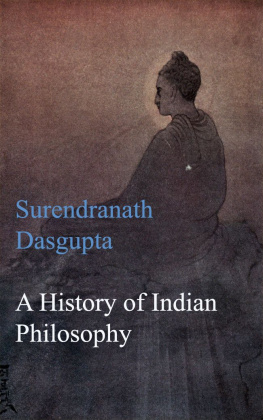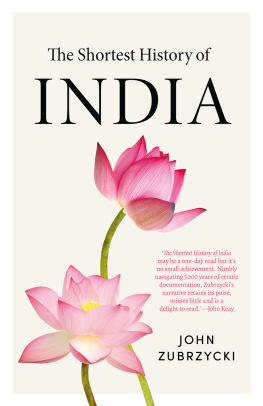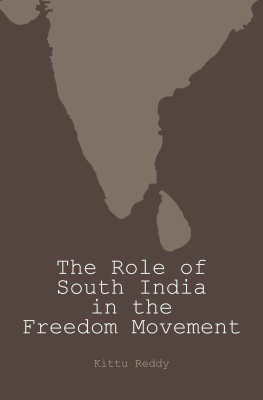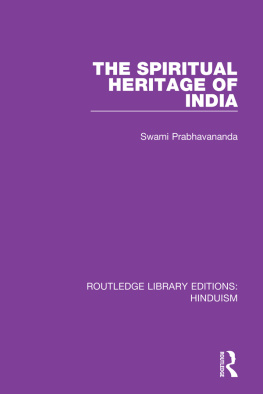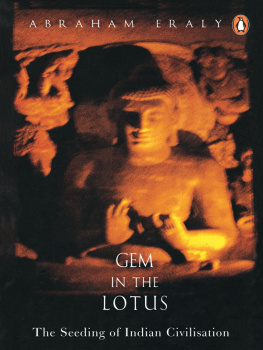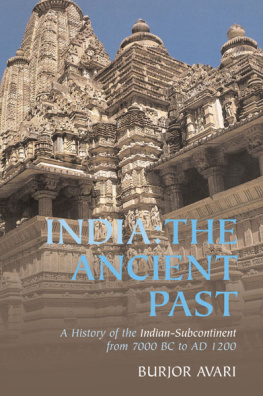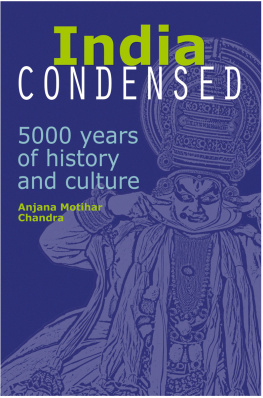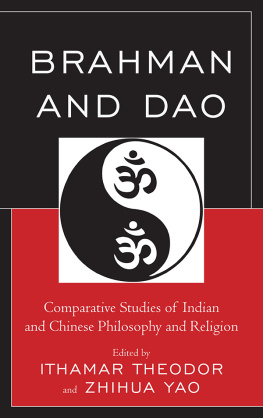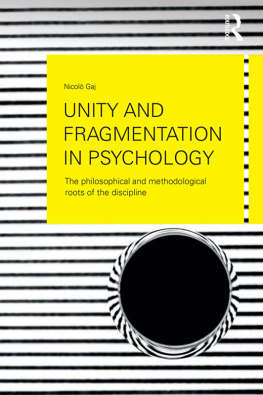Table of Contents
A HISTORY OF INDIAN PHILOSOPHY
SURENDRANATH DASGUPTA
VOLUME I
First Edition: Cambridge, 1922
DEDICATION
The work and ambition of a life-time is herein humbly dedicated with supreme reverence to the great sages of India, who, for the first time in history, formulated the true principles of freedom and devoted themselves to the holy quest of truth and the final assessment and discovery of the ultimate spiritual essence of man through their concrete lives, critical thought, dominant will and self-denial.
NOTE ON THE PRONUNCIATION OF TRANSLITERATED SANSKRIT AND PLI WORDS
The vowels are pronounced almost in the same way as in Italian, except that the sound of a approaches that of o in bond or u in but , and that of a as in army . The consonants are as in English, except c , ch in church; @t , @d , @n are cerebrals, to which English t , d , n almost correspond; t , d , n are pure dentals; kh , gh , ch , jh , @th , @dh , th , dh , ph , bh are the simple sounds plus an aspiration; is the French gn ; @r is usually pronounced as ri , and s' , @s as sh .
PREFACE
The old civilisation of India was a concrete unity of many-sided developments in art, architecture, literature, religion, morals, and science so far as it was understood in those days. But the most important achievement of Indian thought was philosophy. It was regarded as the goal of all the highest practical and theoretical activities, and it indicated the point of unity amidst all the apparent diversities which the complex growth of culture over a vast area inhabited by different peoples produced.
It is not in the history of foreign invasions, in the rise of independent kingdoms at different times, in the empires of this or that great monarch that the unity of India is to be sought. It is essentially one of spiritual aspirations and obedience to the law of the spirit, which were regarded as superior to everything else, and it has outlived all the political changes through which India passed.
The Greeks, the Huns, the Scythians, the Pathans and the Moguls who occupied the land and controlled the political machinery never ruled the minds of the people, for these political events were like hurricanes or the changes of season, mere phenomena of a natural or physical order which never affected the spiritual integrity of Hindu culture. If after a passivity of some centuries India is again going to become creative it is mainly on account of this fundamental unity of her progress and civilisation and not for anything that she may borrow from other countries. It is therefore indispensably necessary for all those who wish to appreciate the significance and potentialities of Indian culture that they should properly understand the history of Indian philosophical thought which is the nucleus round which all that is best and highest in India has grown. Much harm has already been done by the circulation of opinions that the culture and philosophy of India was dreamy and abstract. It is therefore very necessary that Indians as well as other peoples should become more and more acquainted with the true characteristics of the past history of Indian thought and form a correct estimate of its special features.
But it is not only for the sake of the right understanding of India
viii
that Indian philosophy should be read, or only as a record of the past thoughts of India. For most of the problems that are still debated in modern philosophical thought occurred in more or less divergent forms to the philosophers of India. Their discussions, difficulties and solutions when properly grasped in connection with the problems of our own times may throw light on the course of the process of the future reconstruction of modern thought. The discovery of the important features of Indian philosophical thought, and a due appreciation of their full significance, may turn out to be as important to modern philosophy as the discovery of Sanskrit has been to the investigation of modern philological researches. It is unfortunate that the task of re-interpretation and re-valuation of Indian thought has not yet been undertaken on a comprehensive scale. Sanskritists also with very few exceptions have neglected this important field of study, for most of these scholars have been interested more in mythology, philology, and history than in philosophy. Much work however has already been done in the way of the publication of a large number of important texts, and translations of some of them have also been attempted. But owing to the presence of many technical terms in advanced Sanskrit philosophical literature, the translations in most cases are hardly intelligible to those who are not familiar with the texts themselves.
A work containing some general account of the mutual relations of the chief systems is necessary for those who intend to pursue the study of a particular school. This is also necessary for lay readers interested in philosophy and students of Western philosophy who have no inclination or time to specialise in any Indian system, but who are at the same time interested to know what they can about Indian philosophy. In my two books The Study of Patanjali and Yoga Philosophy in relation to other Indian Systems of Thought I have attempted to interpret the Smkhya and Yoga systems both from their inner point of view and from the point of view of their relation to other Indian systems. The present attempt deals with the important features of these as also of all the other systems and seeks to show some of their inner philosophical relations especially in regard to the history of their development. I have tried to be as faithful to the original texts as I could and have always given the Sanskrit or Pli technical terms for the help of those who want to make this book a guide
ix
for further study. To understand something of these terms is indeed essential for anyone who wishes to be sure that he is following the actual course of the thoughts.
In Sanskrit treatises the style of argument and methods of treating the different topics are altogether different from what we find in any modern work of philosophy. Materials had therefore to be collected from a large number of works on each system and these have been knit together and given a shape which is likely to be more intelligible to people unacquainted with Sanskritic ways of thought. But at the same time I considered it quite undesirable to put any pressure on Indian thoughts in order to make them appear as European. This will explain much of what might appear quaint to a European reader. But while keeping all the thoughts and expressions of the Indian thinkers I have tried to arrange them in a systematic whole in a manner which appeared to me strictly faithful to their clear indications and suggestions. It is only in very few places that I have translated some of the Indian terms by terms of English philosophy, and this I did because it appeared to me that those were approximately the nearest approach to the Indian sense of the term. In all other places I have tried to choose words which have not been made dangerous by the acquirement of technical senses. This however is difficult, for the words which are used in philosophy always acquire some sort of technical sense. I would therefore request my readers to take those words in an unsophisticated sense and associate them with such meanings as are justified by the passages and contexts in which they are used. Some of what will appear as obscure in any system may I hope be removed if it is re-read with care and attention, for unfamiliarity sometimes stands in the way of right comprehension. But I may have also missed giving the proper suggestive links in many places where condensation was inevitable and the systems themselves have also sometimes insoluble difficulties, for no system of philosophy is without its dark and uncomfortable corners.

